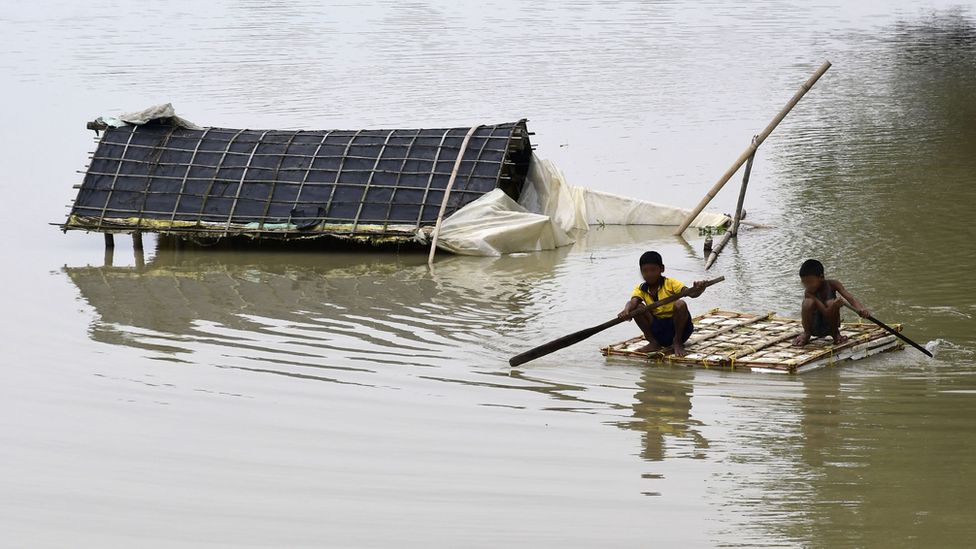Assam: Muslims falsely accused of waging ‘flood jihad’
- Published

After devastating floods hit India's north-eastern state of Assam, claims that members of the local Muslim community were to blame for the disaster began circulating online. But was there any truth to these allegations? One of the accused told the BBC his story.
When the police knocked on his door in the early hours of 3 July, Nazir Hussain Laskar was puzzled. For years, he had worked as a construction worker in Assam, helping the state build flood protections.
But, on that morning, the officers who arrested Mr Laskar accused him instead of "damaging public property" - more specifically, an embankment meant to protect communities from flooding.
"I have spent 16 years working for the government to build embankments", Mr Laskar said. "Why would I damage one?"
Mr Laskar spent nearly 20 days behind bars, before being released on bail. No evidence of his involvement has been found, but the social media storm around him has been raging ever since.
'I thought I might get attacked'
Two waves of flooding hit Assam in May and June, killing at least 192 people. While the state floods every monsoon, this year rains came early and were heavier than usual.
But for a number of social media users, something more sinister was at play here.
They claimed, without proof, that the floods were man-made, and that a group of Muslim men had deliberately inundated the neighbouring Hindu-majority city of Silchar, by damaging flood defences.
Mr Laskar's arrest, along with that of three other Muslim men, triggered a barrage of social media posts accusing them of supposedly waging a "flood jihad".
These posts were shared thousands of times, including by prominent influencers with verified accounts. The claims were then repeated by some local media outlets.
But the gravity of his situation only dawned on him when, already in prison, Mr Laskar caught a mention of his name on television: a news channel accusing him of "flood jihad".
"I was afraid and could not sleep that night. The other inmates were talking about it. I thought I might get attacked."
The truth behind 'flood jihad' claims
The construction of embankments has been central to flood management in Assam since the 1950s. The state has more than 4,000km (2,500 miles) of embankments and many of these are said to be brittle and prone to damage.
On 23 May, an embankment was damaged on the Barak River, which flows through north-east India and eastern Bangladesh.
The breach happened in a Muslim-majority area called Bethukandi - and it was one of several contributing factors to heavy floods in Silchar, which is majority Hindu.
"The cut was one of the causes", says Ramandeep Kaur, superintendent of police in Silchar. "But it wasn't the only point from where water entered the town."
The BBC understands it was this particular incident that led to the arrest of Mr Laskar and three other Muslim men. Later, a fifth man was also arrested. No evidence has been found linking any of them to the breach.
"A lot of these breaches take place because of the lack of repair and maintenance of the embankments," said Nirmalya Choudhury, an associate professor at the Jamsetji Tata School of Disaster Studies in Mumbai.
"Some of it could be also human-induced. It could be that there were instances where people deliberately breached the embankment so that the water would move out, and would not flood their area."
The Silchar police agrees.
"There is no such thing as 'flood jihad'," said superintendent Kaur. "In earlier years, the administration would make a cut in the embankment themselves to drain the water out. This year it wasn't done, and some people took it into their own hands."
"To make this kind of claim [of 'flood jihad'] is to take an easy way out," said Prof Choudhury. "This is a managerial problem, and I think it requires a far more mature response."
'I was accused because I am a Muslim'
According to Google Trends, searches for "flood jihad" hit a five-year peak in July, fed by the social media frenzy around this claim.
But this is hardly the first time anti-Muslim conspiracy theories have hit the mainstream in India.
During the pandemic, Indian Muslims were at times falsely accused of deliberately spreading Covid-19 (what some Indian media outlets described as "corona jihad").
Critics say violence, hate speech and misinformation targeting Muslims has increased since 2014, when Prime Minister Narendra Modi's Hindu nationalist Bharatiya Janata Party came to power. The party disputes this.
Meanwhile, in Assam, Mr Laskar continues to live in fear after his release from jail.
"My family and I are still afraid to leave the house. My children have been skipping school. If I must leave the house, I sometimes wear a helmet to hide my face. I am afraid of being lynched by an angry mob."
"I was accused of 'flood jihad' because I am a Muslim. This is false. Those who are spreading this are doing something very wrong."
Additional reporting by Dilip Kumar Sharma